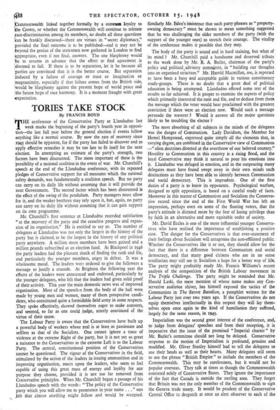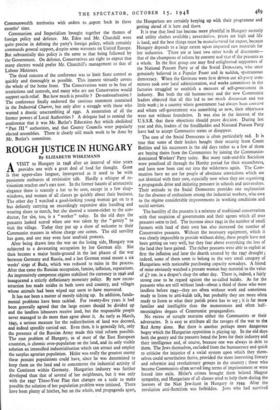TORIES TAKE STOCK
By FRANCIS BOYD HE conference of the Conservative Party at Llandudno last
ir
week marks the beginning of the party's fourth year in opposi- tion—the last full year before the general election if events follow anything like a normal course. By now the rate of recovery since 1945 should be apparent, for if the party has failed to discover and to 'apply effective remedies it may be too late to fit itself for the next election. In attempting an estimate of the party's strength, two factors have been discounted. The more important of these is the possibility of a national coalition in the event of war. Mr. Churchill's speech at the end of the Llandudno conference, with its repeated pledges of Conservative support for all measures which the national safety demands, was fundamentally a coalition speech. But no party can carry on its daily life without assuming that it will provide the next Government. The second factor which has been discounted is the effect of the swing of the pendulum. Party managers must allow for it, and the weaker brethren may rely upon it, but, again, no party can carry on its daily life without assuming that it can gain support on its own programme.
Mr. Churchill's first sentence at Llandudno recorded satisfaction " at the recovery of the party and the ceaseless progress and expan- sion of its organisation." He is entitled to say so. The number of delegates at Llandudno was not only the largest in the history of the party but is claimed, to be the largest in the history of any political party anywhere. A million more members have been gained and a million pounds subscribed as an election fund. At Blackpool in 1946 the party leaders had the pleasant shock of finding the rank and file, and particularly the younger members, angry in defeat. It was a wholesome mood. The leaders were ordered to give the followers a message to justify a crusade. At Brighton the following year the efforts of the leaders were announced and endorsed, particularly by the younger delegates, who felt that the leaders had given solid proof of their activity. This year the main domestic news was of improved organisation. Most of the speeches from the body of the hall were made by young men and women, many of them prospective candi- dates, who constituted quite a formidable field army in some respects. They spoke effectively, showed themselves eager to make converts, and seemed, so far as one could judge, utterly convinced of the virtue of their cause.
The Labour Party is aware that the Conservatives have built up a powerful body of workers whose zeal is at least as passionate and selfless as that of the Socialists. One cannot ignore a trace of violence at the extreme Right of the party, but it is not yet so great a nuisance to the Conservatives as the extreme Left is to the Labour Party. The central, constitutional position of the Conservatives cannot be questioned. The vigour of the Conservatives in the field, stimulated by the action of the leaders in issuing ammunition and in improving organisation, reacts upon the leaders, who seem to feel capable of using this great mass of energy and loyalty for any purpose they choose, provided it is not too far removed from Conservative principles. When Mr. Churchill began a passage of his Llandudno speech with the words : " The policy of the Conservative party which you will allow me to pronounce in your name . . . " one felt that almost anything might follow and would be accepted.
Similarly Mr. Eden's insistence that such party.phrases as " property- owning democracy " must be shown to mean something suggested that he was challenging the older members of the party (with the support of the younger ones) to stretch their courage. The vitality of the conference makes it possible that they may.
The body of the party is sound and in hard training, but what of its mind ? Mr. Churchill paid a handsome and deserved tribute to the work done by Mr. R. A. Butler, chairman of the party's policy and political advisory committee, in " building our thoughts into an organised structure." Mr. Harold Macmillan, too, is reported to have been a busy and acceptable guide in various constituency study-groups. There is no doubt that a great deal of political education is being attempted. Llandudno offered some test of the results so far achieved. It is proper to examine the aspects of policy which primarily interested the rank and file, and to deduce from them the message which the voter would hear proclaimed with the greatest conviction if there were an election now. Would such a message persuade the waverer ? Would it answer all the major questions likely to be troubling the elector ?
The most absorbing of all subjects in the minds of the delegates was the danger of Communism. Lady Davidson, the Member for Hemel Hempstead, expressed quite simply all the elements that, in varying degree, are combined in the Conservative view of Communism —" alien doctrines directed at the overthrow of our beloved country." Hostility to Communism in this country is a rising flood, and the loyal Conservative may think it natural to pour his emotions into it. Llandudno was deluged in emotion, and in the outpouring many delegates must have found swept away in their own minds such distinctions as they have been able to identify between Communism and social democracy. This is imprudent. One of the first duties of a party is to know its opponents. Psychological warfare, designed to split opposition, is based on a careful study of facts. Moreover in this matter of Communism and Socialism the Conserva- tive record since the end of the First World War has left an impression, perhaps even on some of the floating voters, that the party's attitude is dictated more by the fear of losing privilege than by faith in an alternative and more equitable order of society.
Mr. David Eccles is one of the more influential younger Conserva- tives who have realised the importance of establishing a positive case. The danger for the Conservatives is that over-statement of their feelings about Socialism will antagonise the non-affiliated public. Whether the Conservatives like it or not, they should allow for the fact that there is a difference between Communism and social democracy, and that many good citizens who are in no sense totalitarian may still see in Socialism a hope for a better way of life. The party might profitably study Mr. Francis Williams's recent analysis of the composition of the British Labour movement in The Triple Challenge. The party might be reminded that Mr. Harold Laski, the mere mention of whose name makes any Con- servative audience shiver, has himself exposed the tactics of the Communists in The Secret Battalion, a pamphlet written for the Labour Party just over two years ago. If the Conservatives do not equip theniselves intellectually in this respect they will lay them- selves open once again to the kind of humiliation they suffered, largely for the same reason, in 1945.
Imperialism was the second great interest of the conference, and, to judge from delegates' speeches and from their reception, it is imperative that the issue of the promised " Imperial charter " by Mr. Butler's committee should not long be delayed. Conservative response to the motion of Imperialism is profound, genuine and muddled. Mr. Oliver Stanley himself had to tell the delegates to use their heads as well as their hearts. Many delegates still seem to use the phrase " British Empire " to include the members of the Commonwealth. This may be carelessness, but it would not be popular overseas. They talk at times as though the Commonwealth consisted solely of Conservative States. They ignore the importance of the fact that Canada is outside the sterling area. They forget that Britain was not the only member of the Commonwealth to sign the Geneva trade treaty. It would be prudent of the Conservative Central Office to despatch at once an alert observer to each of the Commonwealth territories with orders to 4eport back in three months' time.
Communism and Imperialism brought together the themes of foreign policy and defence. Mr. Eden and Mr. Churchill were quite precise in defining the party's foreign policy, which certainly commands general support, despite some waverers on United Europe. But substantially this policy is the same as that being followed by the Government. On defence, Conservatives are right to expect that many electors would prefer Mr. Churchill's management to that of Labour Ministers.
The third concern of the conference was to limit State control as quickly and thoroughly as possible. This interest virtually covers the whole of the home front. The Conservatives want to be free of restrictions and controls, and many who are not Conservative would support such relief. But how much is possible ? De-nationalisation ? The conference finally endorsed the cautious statement contained in the Industrial Charter, but only after a struggle with those who wanted a drastic unscrambling of eggs. A restoration of all the former powers of Local Authorities ? A delegate had to remind the conference that it was Mr. Butler's Education Act which abolished " Part III " authorities, and that County Councils were popularly elected assemblies. There is clearly still much work to be done by Mr. Butler's committee.



































 Previous page
Previous page